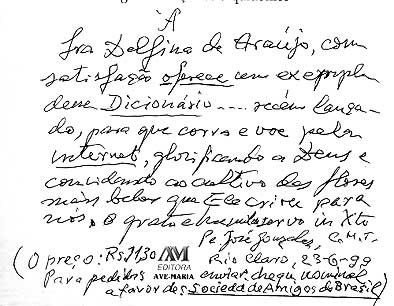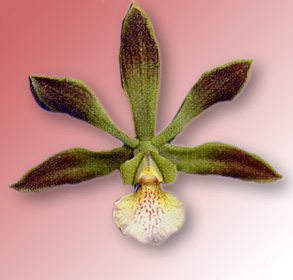|
F
ather José González Raposo, born in l905, March, l9 and
died in November l999.
 Claretian Missionary, born in Spain, he had lived in Brazil for more than 60 years. Here, he developed his pastoral activities. Besides writing books about catechesis, accomplishing the mission chosen by himself, he has been very active in writing articles about orchids to be published in many Brazilian magazines (edited by Caob, by OrquidaRio, by the Sociedade Brasileira de Orquidófilos, by the Círculo Rioclarense de Orquidófilos and by the Sociedade Campineira de Orquídeas - nowadays not edited any more -) and foreigner ones (Orchids, Schlechteriana and Intermezzo).
Claretian Missionary, born in Spain, he had lived in Brazil for more than 60 years. Here, he developed his pastoral activities. Besides writing books about catechesis, accomplishing the mission chosen by himself, he has been very active in writing articles about orchids to be published in many Brazilian magazines (edited by Caob, by OrquidaRio, by the Sociedade Brasileira de Orquidófilos, by the Círculo Rioclarense de Orquidófilos and by the Sociedade Campineira de Orquídeas - nowadays not edited any more -) and foreigner ones (Orchids, Schlechteriana and Intermezzo).
In his journeys into the nature nurseries, as he loved to say, he found new species and described them such as Encyclia reflexa González, Cattleya X extricata González, Encyclia perazolliana González
|
Encyclia
meneziana Gonzalez |
|
|
 For many years, he rendered an inestimable service to national orchidophilia
and in his legacy, he gave to us the "Dicionário etimológico
das orquídeas do Brasil" (1999), "Questões
Práticas de nomenclatura de Orquidáceas" (1993)
and "A etimologia a serviço dos orquidófilos"
(sold out).
For many years, he rendered an inestimable service to national orchidophilia
and in his legacy, he gave to us the "Dicionário etimológico
das orquídeas do Brasil" (1999), "Questões
Práticas de nomenclatura de Orquidáceas" (1993)
and "A etimologia a serviço dos orquidófilos"
(sold out).
He has planed to publish his chronicles of the orchidaceous journeys he
did through Brazil, during more than 25 years, in three illustrated volumes,
called "Pelos Orquidários da Natureza".
 He was an honorary member of the Círculo Rioclarense de Orquidófilos
and of the Society Lombarda Amatori Orchidee, in Italy. His death in November,
last year, left a gap hard to be filled. Owner of a great culture, with
deep expertise in Latin, Greek and Latin languages, his books have always
been an important contribution for who wanted to go ahead in orchid studies.
He was an honorary member of the Círculo Rioclarense de Orquidófilos
and of the Society Lombarda Amatori Orchidee, in Italy. His death in November,
last year, left a gap hard to be filled. Owner of a great culture, with
deep expertise in Latin, Greek and Latin languages, his books have always
been an important contribution for who wanted to go ahead in orchid studies.
With pleasure and happiness he collaborated with many researches who looked
for him such Guido Pabst and Lou Menezes.
This generosity and modesty were unique as it is clearly showed in a small
text called "A etimologia das orquídeas" ("The
etymology of the Orchids"), written when he was 92 years old and
published in Caob magazine number 27: "To find out the correct name
of an unknown species, a determinate basis of Latin and Greek languages
is presumed, besides the knowledge more or less elementary of orchidology.
The knowledge of those two languages is very important to the orchidologists,
mainly Latin which extinction in the regular courses was really regrettable.
Many orchidologists complain about it because we should use Classical
Latin to describe plants and to name genera and species. This is why,
often, they should ask the experts in those languages to solve nomenclatures
problems. Although we recognize our limitations in the knowledge of those
languages, we are ready to answer and to serve all people that need our
humble collaboration, as it has been since not few years ago."

I feel deeply affected with the dedication he did to me when he sent a
copy of his "Dicionário Etimológico dos Gêneros
e Espécies das Orquídeas do Brasil" ("Etymological
Dictionary of genera and species of Brazilian orchids") to be announced
in our site.
In this text,
in spite of being far on his years (he was 94 years old when he died),
we can see how connected with the new technologies he was.
His text let us also see his poetic essence when he talked about Internet
and missionary vocation.
" ... With satisfaction we offer a copy of this Dictionary...
just recently published, in order to run and to flight throughout the
Internet, glorifying God and inviting to the cultivation of the most beautiful
flowers He has created for us... " (Rio Claro, 23.6.99).
We wait, anxiously,
for the publication of the 3 volumes of "Pelos Orquidários
da Natureza ( Through the Nature Nurseries)", chronicles
of the journeys into Brazil, during 25 years.
 Lou Menezes, forest engineer, ecologist and botanist working at IBAMA
(Official Institute for Environment), has had a close relationship with
Father José González.
Lou Menezes, forest engineer, ecologist and botanist working at IBAMA
(Official Institute for Environment), has had a close relationship with
Father José González.
We transcript below the presentation she did in the "Dicionário
etimológico das Orquídeas do Brasil", published
by Ave Maria Editors:
"For many and many years, Father José González has
been offering a valuable and inestimable contribution to the study of
Brazilian orchids, affording orchidists and orchidologists the possibility
of joining the passion for those plants and the botanical science. In
this book with beautiful illustrations, through a deep and impeccable
erudition, the author offers us his ample knowledge about linguistic straight
associated to the origin and identity of the genera, species and varieties
of orchids. This book fills up a gap in the technique and scientific area
of those fascinate and charmed organisms. By his high spirit of humanity,
by his devotion as a nature lover, by his studies and publication, Father
José González has also got an international reputation and
he is, nowadays, by his merits considered as the holly angel of Brazilian
orchidofilia".
In the preface of the same edition, Father González says:
"Our wish was to present a complete work in this "Dicionário
Etimológico dos Gêneros e Espécies das Orquídeas
do Brasil". However, for this, we should make many journeys to
consult specialized libraries and for lack of time, for my age and recently
by health conditions, this wish could not be achieved. In order not to
provoke delays in the publication of the dictionary, we should have to
be acquiesced with a more modest (or simplified) work leaving aside some
aspects not so necessary such as the indication of subfamilies, tribus
and subtribus, omitting the Habenaria species (as indicated in
the appropriated places) and, specially, the illustrations, except for
some, just to avoid monotony. Nevertheless, in order to allow the reader
having an idea of the exuberance of the colors of the species here broached,
we present a folder of color photos. With this simplification, the Dictionary
will become easier to a quick consultation. In spite of the deficiency,
our Dictionary presents a very special note with the etymology of Brazilian
species, lacking in other works about the same subject. Our critical style
intends to do a constructive critique observing what is wrong with the
names given to genera and species and pointing out what would be the correct
name. Our readers will see that all generic and specific names of orchids
which get accent when they formed for more than two syllable, this accent
shows the emphasized syllable of the name which provokes so many difficulties
of pronunciation between the orchidists. We wish that orchidologists and
nature lovers find in this Dictionary, an easy instrument to deal with
in order to know how we write and pronounce so many difficult names, how
they have been formed and their meaning.
Glory to God, Author of this wonderful world of orchids."m
From Acacallis to Zygostates, Father González introduced us to
the etymology of Brazil genera and species. Transcription of an example
(with indication of accentuation) Catasétum L. C. Richard. Hybrid
name: gr. Katá, prep. which indicates direction from top to the
bottom, and lat. Seta, bristle pig, wild pig, etc. In Botany, we use this
word to signify rough hair in the flower involucres of graminaceous plants.
The name is related to two antennas (or appendix) characteristic of male
flowers, which pull the bottom part of the column and works as a true
trigger. Hardly touched by the insect, instantaneously, the shooting of
the anther happens and strongly glues on the back of visitor, unconsciously
agent of the pollination. Catasétum genus has more than
a hundred species, most of them are epiphyte and its habitat is extend
from Mexico to Argentina. However the center of irradiation is in Brazil,
were thrive the follow species; albo-virens Barb. Rodr.: adj. Artif.
Lat. De albus, white + virens, part. Pres. from v. víreo, green.
The name express the green-albish color of the flowers (from Amaz.) .
appendiculátum ... since . of warscewízius latiniz.
from Warcewicz, name. De Joseph W.C. de W.

Transcription of
the last cover of "Dicionário Etimológico dos Gêneros
e Espécies das Orquídeas do Brasil" - A etimologia
a serviço DOS orquidófilos is a work which joins the erudition
of an expert and the sensibility of a nature lover. In the entries, accessible
to botanists or to the public in general, the author shows his great linguistic
and cultural knowledge, reinvestigating in the mythology, in history,
in literature and in natural sciences, the origin and the mean of the
Brazilian orchids. He explains the etymology, he guides to the correct
pronunciation and shows the correct spelling of every scientific name.
This is an essential work for those who study, cultivate and love the
orchids. The book has beautiful illustrations which make the reading more
pleasant. We should point out that, in spite of the scientific rigor,
the author shows here his religious feelings of deep respect and admiration
for the divine creation. Ave-Maria Editors has also published by the same
author "A etimologia a serviço DOS Orquidófilo"
(The etymology to serve the orchidists"), invites the readers to
this new journey into the world of the flowers.
The Dictionary has been put in circulation during the Rio Claro Orchid
Show (São Paulo), in 1999. The Caob Magazine (number 36) has announced
the fact in the topic "Conversando com o Leitor" , written by
his editor Oscar Sachs:
 "During the orchid show in Rio Claro, SP, directed by the dynamic
Dr. Humberto Antonio Epiphânio, we had the issue and the autograph
evening of the "Dicionário Etimológico das Orquídeas
do Brasil", by Father José González Raposo C.M.F.
All of us, in Brazilian orchidophilia, know Father González and
his untiring labor, always attentive and disposed to help whom needs his
deep knowledge about Latin, Greek and Neo-Latin languages. All of us know
the help he has been rendering to our botanists, to do Latin diagnosis,
which is essential for any scientific description of plants or new variety.
This cooperation with Brazilian orchidologists is dated from Guido Pabst.
In "Orchidaceae Brasilienses", one of our basic books,
many propositions from Father González have been accepted and incorporated
in this work. This book, now published, will be, for sure, a mark in Brazilian
orchidologist studies because it is the result of years of researches,
reflection, comparatives analysis, same times even a detective investigation
to find out possible intention of the scientist when he gives a name a
little and unprotected little plant. The "Dicionário etimológico
DAs orquídeas do Brasil" presents a wide list of genera
and species of our orchids, explaining or discussing their etymology,
or to put it in other words, the meaning and the raison of their name.
Those words are, in general, Latin or Greek. When the botanist wanted
to pay homage to someone, the Dictionary presents the name in its form
latinized and its genitive. Often, there is a reference about what the
person has done or his merits, giving in this way, a meaning to the homage
paid for us amateurs. Another merit of Father González's book is
to indicate the tonic syllable of all names, which helps extraordinarily
those companions orchidologists, botanist students and others researches
who look for the correct pronunciation of the scientific names. After
the edition of the Dictionary, we can say that between us, orchidists
or orchidologists, just do a mistake if wanted. Caob and Caob magazine
want, by this little review, pay homage to this extraordinary priest and
intellectual person, who, besides his job as soul shepherd, found time
and disposition to contribute by this dense and important form to orchidophilia
in Brazil. God reward you, our dearest Father González".
"During the orchid show in Rio Claro, SP, directed by the dynamic
Dr. Humberto Antonio Epiphânio, we had the issue and the autograph
evening of the "Dicionário Etimológico das Orquídeas
do Brasil", by Father José González Raposo C.M.F.
All of us, in Brazilian orchidophilia, know Father González and
his untiring labor, always attentive and disposed to help whom needs his
deep knowledge about Latin, Greek and Neo-Latin languages. All of us know
the help he has been rendering to our botanists, to do Latin diagnosis,
which is essential for any scientific description of plants or new variety.
This cooperation with Brazilian orchidologists is dated from Guido Pabst.
In "Orchidaceae Brasilienses", one of our basic books,
many propositions from Father González have been accepted and incorporated
in this work. This book, now published, will be, for sure, a mark in Brazilian
orchidologist studies because it is the result of years of researches,
reflection, comparatives analysis, same times even a detective investigation
to find out possible intention of the scientist when he gives a name a
little and unprotected little plant. The "Dicionário etimológico
DAs orquídeas do Brasil" presents a wide list of genera
and species of our orchids, explaining or discussing their etymology,
or to put it in other words, the meaning and the raison of their name.
Those words are, in general, Latin or Greek. When the botanist wanted
to pay homage to someone, the Dictionary presents the name in its form
latinized and its genitive. Often, there is a reference about what the
person has done or his merits, giving in this way, a meaning to the homage
paid for us amateurs. Another merit of Father González's book is
to indicate the tonic syllable of all names, which helps extraordinarily
those companions orchidologists, botanist students and others researches
who look for the correct pronunciation of the scientific names. After
the edition of the Dictionary, we can say that between us, orchidists
or orchidologists, just do a mistake if wanted. Caob and Caob magazine
want, by this little review, pay homage to this extraordinary priest and
intellectual person, who, besides his job as soul shepherd, found time
and disposition to contribute by this dense and important form to orchidophilia
in Brazil. God reward you, our dearest Father González".
The Editor.
 |
| Cyrtopodium
gonzalesii |
Ave Maria Editors
(by the President Father Nestor Zatt), Boletim Caob (by the editor, Oscar
Sachs Jr, Editora Três (by the editor: Paulo Roberto Houch) and Lou Menezes
have authorized all transcriptions. Dr. Luiz de Araújo Pereira and Father
Elias Leite have written specially for Orchid News.
Species paying homage to Father González in their name: Sarcoglottis gonzalezii L.C. Menezes. According to the author of the description, the name of this species has been done in his homage due to his valuable contribution in her studies about the flora of Brazilian Orchids. Encyclia gonzalezii L. C. Menezes, Cyrtopodium gonzalezii L.C. Menezes.
|


